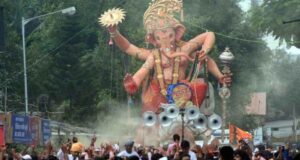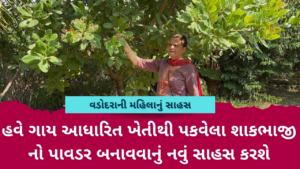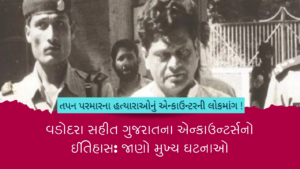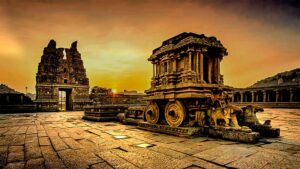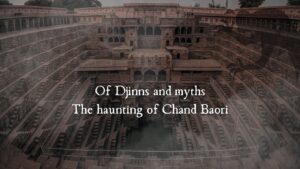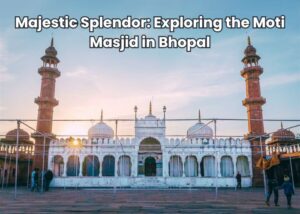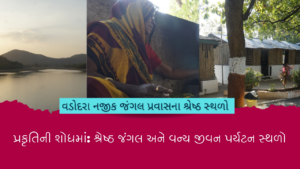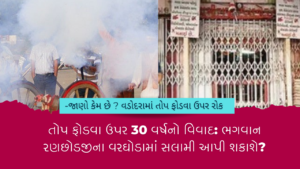–An Article by Poojan Patel
In the heart of beautiful Gujarat, Pavagadh Hill stands quietly, holding stories of mythology, Rajput bravery, and the echoes of Sultan Mahmud Begda’s victories. At the center of this tale is the sacred Maha Kali Mata temple, believed to be founded by the respected Vishwamitra Rishi in ancient times.
Around 1300 AD, the descendants of Prithviraj Chauhan arrived in Champaner-Pavagadh, and they became known as the Khichi Rajputs. Khichi Hamir, one of their noble ancestors, played a crucial role in shaping the legacy of the Khichi Rajputs, leaving their mark on the sands of time.
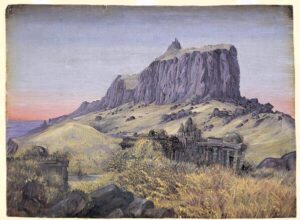 As we step into the 15th century, where myth and reality blend, a captivating story unfolds. Legend has it that Mahakali descended in the form of a woman to Champaner, attracted by the rhythmic beats of Navratri. However, King Jaysinh’s misbehavior during her divine dance brought forth a curse that lingered over his reign.
As we step into the 15th century, where myth and reality blend, a captivating story unfolds. Legend has it that Mahakali descended in the form of a woman to Champaner, attracted by the rhythmic beats of Navratri. However, King Jaysinh’s misbehavior during her divine dance brought forth a curse that lingered over his reign.
Fast forward to the year 1484, a time of clash between mythic tales and human ambitions. Gujarat Sultan Mahmud Begda triumphed over Pavagadh’s ruler, Pavapati Rawal Jaysinh Khichi. This conquest not only marked Begda’s victory but also transformed Champaner-Pavagadh into the capital of his growing empire.
In the aftermath of defeat, King Jaysinh faced a challenging choice – embrace Islam or face death. Jaysinh, showing remarkable resolve, chose the latter, a decision echoing the echoes of a mythic curse that seemed to find its conclusion in historical tumult.
As the British era unfolded in India, the princely Rajput states of Devgadh Baria and Halol found themselves connected to the legacy of Pavagadh’s Mahakali temple. They paid an annual tribute to the Poojari (priest) of the temple, a heartfelt acknowledgment of the enduring spiritual significance embedded in the region.
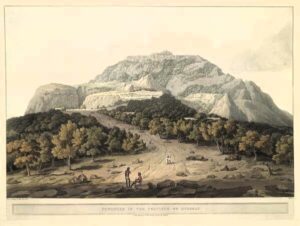 Beyond the tales of myths and conquests, Pavagadh and Champaner stand as living stories woven by the hands of time. The Rajput legacy, the divine dance of Mahakali, and the Sultan’s triumph are threads intricately intertwined, creating a narrative that resonates with the humane spirit of Gujarat’s rich history.
Beyond the tales of myths and conquests, Pavagadh and Champaner stand as living stories woven by the hands of time. The Rajput legacy, the divine dance of Mahakali, and the Sultan’s triumph are threads intricately intertwined, creating a narrative that resonates with the humane spirit of Gujarat’s rich history.
As we gaze upon Pavagadh’s majestic hill, crowned by the temple of Maha Kali Mata, let us remember that the stories engraved in these ancient stones are not just relics of the past; they are living whispers that echo through the corridors of time, inviting us to connect with the heart and soul of this incredible journey.
The 215-year-old color painting of Pavagadh was painted by British artist Havel in 1808 AD.
The 144 years painting of Pavagadh was painted by a British lady tourist artist Marianne in 1879 AD.







